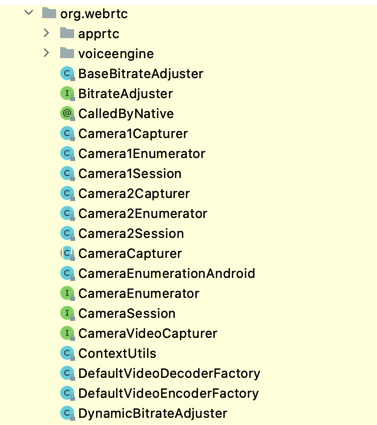Resolving WebRTC compatibility issues between multiple dependencies
In this article we continue discussing some of the challenges we’ve faced working in mobile app development. This time we cover resolving 3rd party dependency conflicts when encountering the same dependency within multiple application components.
Our Android Unite app uses a 3rd party proprietary library that drives all VoIP functionality. Under the hood it uses WebRTC packages.

While integrating another app module that also used WebRTC as its dependency we’ve faced the following issue at compile time due to duplicates in classpath:
Duplicate class org.webrtc.BaseBitrateAdjuster found in modules jetified-libwebrtc-runtime.jar (libwebrtc.aar)
Duplicate class org.webrtc.BitrateAdjuster found in modules jetified-libwebrtc-runtime.jar (libwebrtc.aar)
Duplicate class org.webrtc.CalledByNative found in modules jetified-libwebrtc-runtime.jar (libwebrtc.aar)
Duplicate class org.webrtc.Camera1Capturer found in modules jetified-libwebrtc-runtime.jar (libwebrtc.aar)
Duplicate class org.webrtc.Camera1Enumerator found in modules jetified-libwebrtc-runtime.jar (libwebrtc.aar)
Duplicate class org.webrtc.Camera1Session found in modules jetified-libwebrtc-runtime.jar (libwebrtc.aar)
Duplicate class org.webrtc.Camera1Session$1 found in modules jetified-libwebrtc-runtime.jar (libwebrtc.aar)
Duplicate class org.webrtc.Camera1Session$2 found in modules jetified-libwebrtc-runtime.jar (libwebrtc.aar)
Duplicate class org.webrtc.Camera1Session$SessionState found in modules jetified-libwebrtc-runtime.jar (libwebrtc.aar)
...
Our first thought was: most likely our VoIP library just copied the original WebRTC classes, so we could try to remove them from its jar file, and resolve build errors. We did this and the compilation was successful =) However, the following crashes appeared at runtime:
java.lang.ClassNotFoundException: Didn't find class "org.webrtc.MediaCodecVideoDecoder" on path: DexPathList[[zip file "/data/app/<app_package_name>==/base.apk"],nativeLibraryDirectories=[/data/app/<app_package_name>==/lib/arm64, /data/app/<app_package_name>==/base.apk!/lib/arm64-v8a, /system/lib64]]
at dalvik.system.BaseDexClassLoader.findClass(BaseDexClassLoader.java:196)
at java.lang.ClassLoader.loadClass(ClassLoader.java:379)
at java.lang.ClassLoader.loadClass(ClassLoader.java:312)
at java.lang.Runtime.nativeLoad(Native Method)
at java.lang.Runtime.nativeLoad(Runtime.java:1115)
at java.lang.Runtime.loadLibrary0(Runtime.java:1069)
at java.lang.Runtime.loadLibrary0(Runtime.java:1007)
at java.lang.System.loadLibrary(System.java:1667)
...
#
# Fatal error in ../../sdk/android/src/jni/classreferenceholder.cc, line 132
# last system error: 11
# Check failed: !jni->ExceptionCheck()
# error during FindClass: org/webrtc/MediaCodecVideoDecoder
#
Needless to say, an unsuccessful attempt. Obviously, our app module and VoIP library are using different versions of WebRTC. The ideal solution would be if the VoIP SDK vendor in the implementation of their library would completely rename classes copied from WebRTC since they are using them as part of the library source rather than as a dependency. For example, the package name would change from org.webrtc to com.voipsdk. But, since we don’t have access to library sources and waiting for the requested update from the vendor side could take too much time, we had to find another way to resolve the issue.
We decided to rename the package name when adding the original WebRTC library from org.webrtc to something else, for example, unite.webrtc. Then the absence of conflicts during compilation and in runtime should be guaranteed.
There are two ways to rename the package name of the original WebRTC:
- rename the package name in the sources and build a new library
- rename the package name in the
libwebrtc.aar’s classes and binaries
The first way appeared to be easier, since renaming packages of Java classes in the libwebrtc.aar binary looks non-trivial. So, we downloaded the webrtc sources and started looking for what needed to be renamed there.
Rename org.webrtc occurrences
It’s clear that the first thing that needed to be renamed in the source was all occurrences of the substring org.webrtc to unite.webrtc. Examples of such occurrences:
package org.webrtc;
...
...
import org.webrtc.ThreadUtils.ThreadChecker;
...
<manifest xmlns:android="http://schemas.android.com/apk/res/android"
package="org.webrtc">
<uses-sdk android:minSdkVersion="21" android:targetSdkVersion="23" />
</manifest>
Replace in Files… and you’re done! However, in addition to renaming the
package org.webrtc to
package unite.webrtc, we also needed to rename
the path to such files, for example:
./sdk/android/api/org/webrtc/AddIceObserver.java ->
./sdk/android/api/unite/webrtc/AddIceObserver.java.
We had to do this manually but, don’t worry, we will automate later.
Rename org/webrtc occurrences
There is a reference to java files by their relative path, in the configuration
files and the C source codes. So we had to rename all the substrings of
org/webrtc to unite/webrtc:
BUILD.gn:
rtc_android_library("base_java") {
sources = [
"api/org/webrtc/Predicate.java",
"api/org/webrtc/RefCounted.java",
"src/java/org/webrtc/CalledByNative.java",
"src/java/org/webrtc/CalledByNativeUnchecked.java",
simple_peer_connection.cc:
jmethodID link_camera_method = webrtc::GetStaticMethodID(
env, pc_factory_class, "LinkCamera",
"(JLorg/webrtc/SurfaceTextureHelper;)Lorg/webrtc/VideoCapturer;");
Rename org_webrtc occurrences
To access Java classes through the JNI interface, the class name description
is used through org_webrtc prefixes, so we had to rename it to unite_webrtc too:
ice_candidate.cc:
return NativeToJavaObjectArray(jni, candidates,
org_webrtc_IceCandidate_clazz(jni),
&NativeToJavaCandidate);
And for the most part, that’s it. If you do the correct renaming of these entries (there will be about 250 changes in the code, including files moving), then it will be possible to build a correctly working libwebrtc.aar which will have all java classes with the unite.webrtc package.
It would be possible to commit these changes to a WebRTC fork, and all builds of this fork would have a different package name. However, there would be a lot of maintainability issues in this case. For example, if new Java files would be added to the original repository, then in our repository we would have to rename them again. There would also be a risk of complex merge conflicts when updating a fork. Therefore, to simplify maintainability we would not commit so many changes.
It seems that the changes made to the code are mechanical enough to be automated with some simple Python script.
So, here is the plan:
- Make a script that will rename these entries
org.webrtc/org/webrtc/org_webrtc - Run this script every time before building
webrtc - Profit!
By doing this, we are not making any changes to the source code of WebRTC, but simply running a special script for preparing the project before building!
The script we created appears to be universal and it can be found in intermedia-net/jpkgchanger, and it is most likely may be suitable not only for assembling WebRTC with custom package name:
jpkgchanger --current org.webrtc --target unite.webrtc